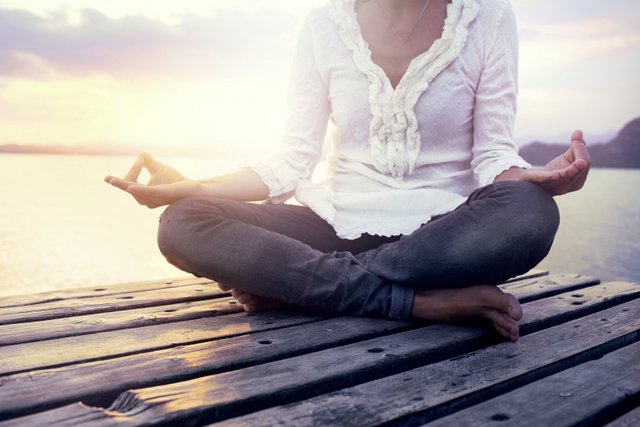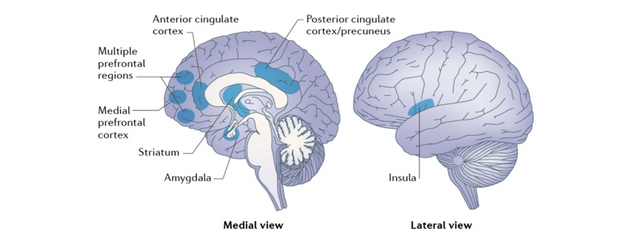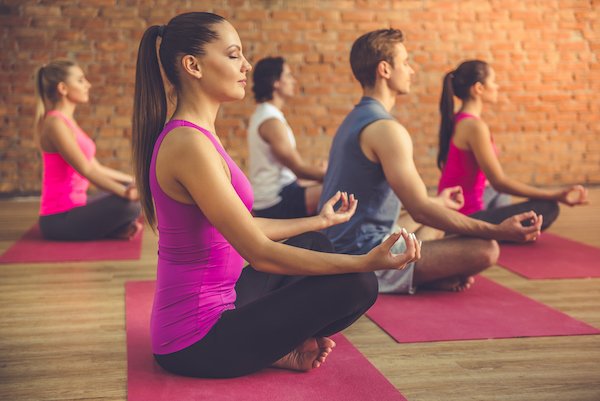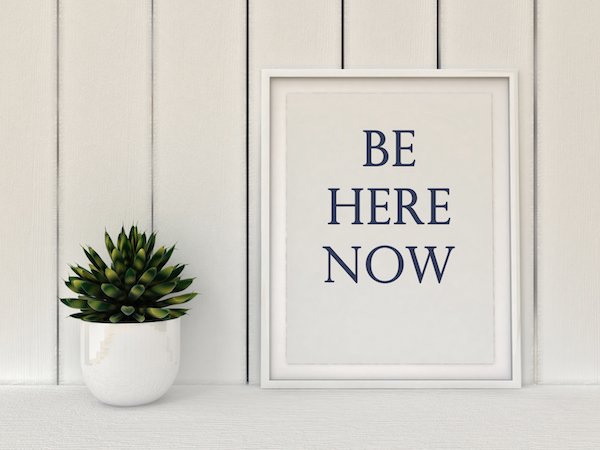
Introduction
We hear a lot about mindfulness in the press and few people seem to know what it is or know much about it.
Mindfulness refers to a specific type of meditative practice.
There is not one single type of mindfulness mediation (MM) but rather multiple types that share certain characteristics.
According to Tang and Leve [1]:
"Mindfulness meditation is composed of several key components aimed at progressively orienting the participant to an awareness of the connection and synergy between body and mind. Techniques employed to attain this state include body relaxation, breathing practice, mental imagery, and body and mind awareness"
A lot of people have asked me about MM and so I thought it would be useful to do a very brief summary.
If people are really interested I can do more in depth analysis in future posts.
What Can Mindfulness Help With?

I think most practitioners would probably suggest that it can help deal with any sort of condition due to the mind/body relationship.
Research so far has suggested a positive benefit in the following conditions:
- Chronic Pain.
- Depression, Anxiety and other Mental Health Problems.
- Substance Misuse.
It is still early days in terms of research though.
From my reading on the subject it seems that scientific study (particularly from a medical perspective) only really gained momentum in the last 20 years or so.
Why Does It Work?
This is not fully understood from a scientific standpoint.
Like I said the research is still in the early stages with regards to this.
There are hypotheses though which seem to be supported by some fMRI (Functional Magnetic Resonance Imaging) brain studies.

Diagram of Brain Regions Involved In Mindfulness Meditation Taken from Tang and Leve
The brain regions shown above are associated with regulation of attention, self awareness and emotional control.
It appears that MM "exercises" these regions and may produce long lasting structural changes to them.
The paper by Tang and Leve (read/download here) contains a good summary of the neuroscience research if you would like to read more.
My Experience

I personally participated in a 6 month group course to learn Mindfulness Meditation after reading a lot of literature on the subject which suggested a positive benefit in depression.
You don't have to go to a formal group to learn but I think it is a great way to pick up the habit and the social aspect makes it easier to learn I think.
Overall I found that doing the mindfulness course helped to improve my ability to deal with stress and reduced my anxiety levels.
It also significantly improved my sleep - I have always been a bad sleeper but if I do a short MM practice before bed I can go to sleep much faster.
I think the combination of improved sleep and better ability to cope with stress have meant that my depression has been much better controlled.
I also had a tendency in the past to try to self medicate with alcohol and the mindfulness has definitely helped me to give up drinking completely.
Will It Work For You?
I can't say for sure but I think it is worth trying - I have not really come across any negative aspects of it.
As a precaution I would still suggest that you discuss it with your health professional first.
In some places you may even be able to get referred to a MM course by your GP (General Practitioner) or other health professional and they may also be aware of other resources.
Resources To Teach Yourself
You don't have to do a formal course to learn mindfulness meditation.
There are an ever growing number of online resources which you can use to teach yourself - many of which are completely free.
A lot of formal programs and research are based on the work of John Kabat-Zinn who is both a meditation practitioner and serious researcher.
You can find a lot of his videos on Youtube.
The Guided Body Scan is one of my favourites:
If you prefer reading, his books are highly recommended and a good resource to teach yourself - here is a link to him on Amazon.
His latest book is called "Mindfulness for Beginners: Reclaiming the Present Moment―and Your Life" and you can get it here.
There are also official resources online like BeMindful.co.uk which have links to online and offline courses.
Conclusion

I hope you have found this quick summary of mindfulness meditation useful.
If you have any further questions let me know and I will try to help.
Just to be clear I'm not an expert as I have only been doing it for a couple of years myself! Meditation is one of those things that seems to get better with time and experience.
If you do try it please let me know how you get on.
References
- Tang, Yi-Yuan, and Leslie D. Leve. 2016. “A Translational Neuroscience Perspective on Mindfulness Meditation as a Prevention Strategy.” Translational Behavioral Medicine 6 (1): 63–72.
Thank you for reading

If you like my work please follow me on Steemit: @thecryptofiend & on Twitter : Soul_Eater_43. Don't forget to share your posts and posts you like on other Social Media - it all helps spread the word about Steemit!
All uncredited images are taken from my personal Thinkstock Photography account. More information can be provided on request.
Before you go have you filled in the Coinbase form to list STEEM? It only takes a few seconds. THIS POST shows you how.
Are you new to Steemit and Looking for Answers? - Try:

Definite resteem. This is incredibly useful.
The way I see it, the brain is constantly working throughout the day, on both the conscious and subconscious level. Then you do to sleep, and the brain is in overdrive once again once you dive into the dream realm.
Meditation is the only opportunity that your brain will get to rest. And like anything, after a rest, it will begin to work more efficiently.
I started it to improve my memory, as I did a fair few A class drugs in my teens and felt I damaged my brain a fair bit. It helped me with my memory, but also helped me accidentally learn to control my dreams, sleep a lot easier just like you, improved my focus and my patience and I also don't think I have been sick since more than a couple of times since I started it a good few years ago.
I'd definitely recommend it also, but it is certainly not easy when you are just starting out. Like anything, it is a skill that needs to be cultivated, so if you are going to give this a try, don't give up so easily. The benefits far outweigh the potential frustration you might have whilst learning how to do it.
Downvoting a post can decrease pending rewards and make it less visible. Common reasons:
Submit
Thank you. Yes for sure it is something that needs practice. That's why I did the course. It got me into the habit of doing it and now I can easily switch into mindfulness mode whenever I have a moment here or there or I'm waiting for something.
Downvoting a post can decrease pending rewards and make it less visible. Common reasons:
Submit
Yes, it becomes a lot easier once you have been doing it a while.
I can't get anywhere near as deep as I used to go, I'm guessing perhaps because of a diet change. But, when I was going very deep into meditative states, it's crazy how similar the feeling actually was to that of the A class drugs I was doing in my teens, specifically ecstasy in this case.
I think whatever chemical is induced by the drugs is naturally secreted during deep states of meditation, so it can be utterly euphoric as well as healthy for your mind and body. There's really no good reason not to be doing it..
Downvoting a post can decrease pending rewards and make it less visible. Common reasons:
Submit
You might try doing it in a group - it seems to make it more intense for me at least.
Yes I think so. I suspect that that the neurotransmitter profile may be quite similar to some drugs - without the side effects!
Downvoting a post can decrease pending rewards and make it less visible. Common reasons:
Submit
I haven't tried it in a group, but I did try it with one other person before and I just fell asleep. Definitely something I shall give a try if returning to my previous diet, which I plan to do very soon, doesn't have the desired effect.
Thanks for the advice!
Downvoting a post can decrease pending rewards and make it less visible. Common reasons:
Submit
Agree and thanks taking the time to shine some light on mindfulness! I was introduced to the practice a few months ago and it has been a lifesaver, to say the least. There are a lot of great ios apps too!
Downvoting a post can decrease pending rewards and make it less visible. Common reasons:
Submit
Yes actually I forgot to mention the apps thanks for bringing them up!
Downvoting a post can decrease pending rewards and make it less visible. Common reasons:
Submit
Medication won't solve the problem/stress...mindfulness takes some good practice..one's brain will play tricks...but practice makes perfect & things start click into bigger picture...I've started recently 30 days of yoga challenge, now on day 20, it does make a difference :)
Downvoting a post can decrease pending rewards and make it less visible. Common reasons:
Submit
Yes medication on it's own rarely does much more than giving some short term assistance (or helping to reduce the risk of relapses) - you need other strategies to deal with stress.
Downvoting a post can decrease pending rewards and make it less visible. Common reasons:
Submit
Very nice and easy to understand summary... in my personal experience, this kind of natural is far more effective than pharmaceuticals for stress, anxiety and more. AND it doesn't "shred your liver" and 400 other side effects.
I started doing "walking meditations" about 10 years ago, and it radically reduced my stress levels... and my blood pressure. I know it's not exactly the same thing as MM, but it still involves active awareness of the body, steps and breath. I just like it because it adds movement to the mix.
Downvoting a post can decrease pending rewards and make it less visible. Common reasons:
Submit
Actually walking meditation does count - I learned it myself and use it when I am walking. That's the great thing about MM there are lots of ways to do it so you can pick what works best for you:)
Downvoting a post can decrease pending rewards and make it less visible. Common reasons:
Submit
Nice post...
As the modern world continues to spiral faster and faster, people are becoming lost, then purposeless and finally depressed. It is because their mind is no longer under their personal control and confusion overwhelms.
Mindful Meditation will help them re-calibrate.
Downvoting a post can decrease pending rewards and make it less visible. Common reasons:
Submit
Yes I think so. Thank you:)
Downvoting a post can decrease pending rewards and make it less visible. Common reasons:
Submit
More of this content will bring a wilder variety of people to find interest in steem and build up the community
Downvoting a post can decrease pending rewards and make it less visible. Common reasons:
Submit
Thanks I hope people find it interesting.
Downvoting a post can decrease pending rewards and make it less visible. Common reasons:
Submit
sooo good! Why does in not have a Resteem button? (i am new here)
Downvoting a post can decrease pending rewards and make it less visible. Common reasons:
Submit
I think because it is an old post.
Downvoting a post can decrease pending rewards and make it less visible. Common reasons:
Submit
so for how long is it possible to share. Do you know?
Downvoting a post can decrease pending rewards and make it less visible. Common reasons:
Submit
Probably until the post pays out.
Downvoting a post can decrease pending rewards and make it less visible. Common reasons:
Submit
Thank you for sharing. I upvoted your post and you have a new follower.
Downvoting a post can decrease pending rewards and make it less visible. Common reasons:
Submit
Thank you so much for your support :)
Downvoting a post can decrease pending rewards and make it less visible. Common reasons:
Submit
Gosh, I miss having time to meditate. I was super obsessed with meditation, techniques, practices, philosophies, etc. Jon Kabat-Zinn is a great a author. So is Eckhart Tolle. I also recommend you look into Jack Kornfield and Tara Brach. I believe they both have YouTube Channels. After a stressful day, I will lay next my cell phone an listen to one of Tara's talks until I fall asleep. I think I should do that right now. Thanks for the post! I needed a reminder to be in the present moment! Whenever I have time I plan on writing a lot about the subject, since I used to study different types of buddhism and have learned a lot along the way. Take care. :)
Downvoting a post can decrease pending rewards and make it less visible. Common reasons:
Submit
Cool thank you for sharing your experiences and the links will check them out:)
Downvoting a post can decrease pending rewards and make it less visible. Common reasons:
Submit
Great writeup! I'll resteem this post.
Downvoting a post can decrease pending rewards and make it less visible. Common reasons:
Submit
Thank you so much :)
Downvoting a post can decrease pending rewards and make it less visible. Common reasons:
Submit
upvote resteem and follow
Downvoting a post can decrease pending rewards and make it less visible. Common reasons:
Submit
Thank you very much :)
Downvoting a post can decrease pending rewards and make it less visible. Common reasons:
Submit
Thank you for the reminder, It's just what I needed right now. Great article too.
Downvoting a post can decrease pending rewards and make it less visible. Common reasons:
Submit
No problem glad you found it useful:)
Downvoting a post can decrease pending rewards and make it less visible. Common reasons:
Submit
I worked at a resort that encouraged mindfulness for its employees and guests. I remember in the orientation we met with a nutritionist and she talked about mindful eating. We were served a nice plate of food and told to eat slowly and think about the taste and texture of the food. This was a whole new experience for me and secretly thought it was kind of a joke. I then realized how often I had eaten without even enjoying it or thinking about it. I could go on about my experiences but my point is I remember those experiences like yesterday and still practice many of them.
Thanks for the post and the reminder!
Downvoting a post can decrease pending rewards and make it less visible. Common reasons:
Submit
Thanks for sharing your experiences.
This is a common exercise in mindfulness courses - I think it is also in one of Kabat-Zinn's books.
It is surprising how much of life we go through mindlessly instead of mindfully.
I recount reading a study several years back about how mindful eating had been successfully used to help treat obesity.
It did not solve the entire problem for people who were overweight but it did help them as part of combined treatment.
I have had my own issues with overeating in the past and a couple of years ago when I went to see a dietitian I was impressed to see she actually mentioned this research and the importance of mindfulness when eating!
Downvoting a post can decrease pending rewards and make it less visible. Common reasons:
Submit
I could see how that would be very helpful for people who want to have more control over their weight. I don't think we had a single person in orientation with a weight issue. I am certain that the majority of us seldom mindfully ate and that could lead to weight issues in the future.
Downvoting a post can decrease pending rewards and make it less visible. Common reasons:
Submit
Interesting. I also think that often overeating (for me at least) just like alcohol is a self-medication or mental escape strategy.
Downvoting a post can decrease pending rewards and make it less visible. Common reasons:
Submit
Upvoted. Here's my 2 cents on the subject -
https://steemit.com/life/@sifodyas/mindfulness-starter-kit
Downvoting a post can decrease pending rewards and make it less visible. Common reasons:
Submit
Thanks I will check it out:)
Downvoting a post can decrease pending rewards and make it less visible. Common reasons:
Submit
it is not interesting for the mind to meditate, or even relax ... that's why meditation seems so out of reach for many ... it is like a paradox because how can we become more mindful if we don't even want to stop distracting ourselves?
it is truly a miracle that can happen when we find ourselves in a tough spot, a space of limbo, perhaps emotionally, or even physically, and are looking for a way out of this predicament
this miracle is our Willingness to move into a direction that is relaxing, calming, centering, balancing, harmonizing, and clearing ...
even if our mind is screaming to feed it with more of the substance of mass distraction that it is addicted to
Downvoting a post can decrease pending rewards and make it less visible. Common reasons:
Submit
Thanks for sharing these super powerful insights @thecryptofiend!
Sharing 💚
Downvoting a post can decrease pending rewards and make it less visible. Common reasons:
Submit